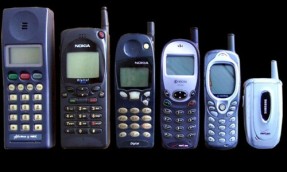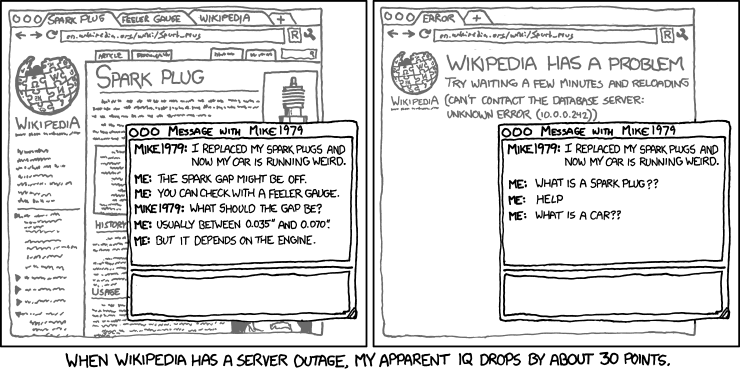Memory is a tough thing and it is something I struggle with on a DAILY basis. It started when I got my first phone; back when the phone was JUST for phone calls. Texting was new and no one did it yet, you sent an email from your phone instead. That when I went from knowing every phone number I’d ever been given to knowing… three, and two of those bring me food so I’m not sure if they even count (it’s a few more than three but for drama I’m gonna change it). It was a strange change when I had to start keeping my phone in my pocket and look up numbers to dial on the house phone if I wanted to call before 8pm (calls were free after 8pm).

Thompson addresses this with his short anecdote about the incident in Starbucks, though I’m never asked a friend a question in Starbucks without some rando answering it, and it really got me thinking to how awful my memory is, or at least my perception of it. I’m going to share with you how I realized I couldn’t rely on my phone for everything.
Last year, during Spring of 2017, I went to Tokyo for spring break. It feels like it was longer ago but when I look back through my planners it seems like it was yesterday.

There are a few posts I’ve actually made on this blog about this trip, but it was a series I didn’t finish and for continuity’s sake, I didn’t want to feel pressured to finish them just yet so, I set them to private. But it was in Japan that I realized I am on my phone way too much.

I have a very rudimentary understanding of the Japanese language, mostly because I can’t remember it when I need to use it. But I figured I was halfway through my second semester of the basic language class and I’d just KNOW it when I got there. I had always wanted to go and instead of paying off some of my debt, I spent about 995 dollars on a flight and a hotel and went. There is a lot that I went through to get there, but it was fine in the end.
Now, I had never been to Japan before and I had no idea how complicated getting around would be. I had rented a pocket wi-fi but, when I picked it up from the post office in the terminal, it wasn’t charged. So getting to the train (which are never late and when they are the company releases a national apology) in the 5 minutes I had given myself from the purchase time was complicated. It was like I had literally forgotten how time worked.
 I am not one to get lost, but I did in Tokyo. I did my best to memorize the map on the train but it was quickly gone from my memory once I stepped foot onto the platform. I instinctively reached for my phone which I had turned on in the airport and then realized I had been roaming for about an hour (thankfully I didn’t get any calls and the phone had just been on). But my phone was no use it had no service.
I am not one to get lost, but I did in Tokyo. I did my best to memorize the map on the train but it was quickly gone from my memory once I stepped foot onto the platform. I instinctively reached for my phone which I had turned on in the airport and then realized I had been roaming for about an hour (thankfully I didn’t get any calls and the phone had just been on). But my phone was no use it had no service.
I felt stupid. Absolutely stupid that I hadn’t thought about this beforehand and I struggled to find my hotel (which was literally 150 meters from the surface entrance of the station I got off at). I thought I’d be able to rely on my phone right away, I had it all written down on my Google Drive. Guess what you need access to in order to get to your Google Drive?
My hotel was so nice to me, they could tell that I was lost, tired, and sweaty. The clerk that checked me in did his best to speak English and I appreciated it because the Japanese I had practiced on the plane had apparently stayed there, recirculating in the vents above US-bound passengers heads (I also didn’t find them when I flew home).
that checked me in did his best to speak English and I appreciated it because the Japanese I had practiced on the plane had apparently stayed there, recirculating in the vents above US-bound passengers heads (I also didn’t find them when I flew home).
I could have just printed a map onto a piece of paper and followed it from there. I didn’t because I rely so much on my phone I just figured it wouldn’t be an issue. But I think I needed to get lost in Tokyo. Not only is it one of the nicest cities I’ve ever been in, but it is also the best place to get lost. The crime rate is incredibly low (not to mention I’m a damn Ice Giant) and people keep to themselves. I needed to get lost though to re-engage my brain into how I grew up, surviving off of memory. It made me realized that I am too dependant, and if I did have a Japanese phone plan I wouldn’t have had this problem. I’m not entirely comfortable in how reliant I am (because the machines are coming for us all) but I now understand that I partially allow myself to be because it does make life easier.
Our brains aren’t chess-playing computers, they can’t compute every outcome ever in seconds. The amount of knowledge that our phones allow us to store and recall isn’t a bad thing. But I also think it’s important that we take a step back away from the loads of information we try to process on a daily basis and remember that our brains can remember things as well.



Kas,
I like how you use memory as an analogy. Your post about Japan is really good, by the way. I liked how you took the travel metaphor and I saw the comparison between traveling through Japan and navigating the pitfalls of the internet. I also wanted to raise a hypothetical question. When you get lost as you step off the train and can’t find your hotel, did you really know what you were looking for or what you were doing in the first place?
Sometimes it may feel like that to the untrained eye as the navigate the interweb. The thing we really need (our hotel) is pretty damn close to where we are, but we can’t even see it for all the extra information that’s in the way. This seems to demonstrate the frustrations of operating as an individual in a world with 8 billion other individuals.
Hey Kas,
Nice illustrative post about memory. It was interesting to hear about your trip to Japan, and I hope it ended up being a good experience overall. Memory, which I wrote about in my blog post as well, is such a complicated thing, and without technology, from writing down to using a phone or the internet, it would be nearly impossible to remember anymore, seeing as “if you don’t use it, you lose it,” like my grandparents say all the time. I’m sure in Aristotle’s time, having a good memory was like a special skill you could utilize and play with, but now we hardly need it at all, and we don’t even have it when we require it. We’ve become too dependent on technology for a memory. It’s like phones have become an external form of our memory, just to put it into context, and I wholly agree that this has dangerous implications.
Thanks for sharing!